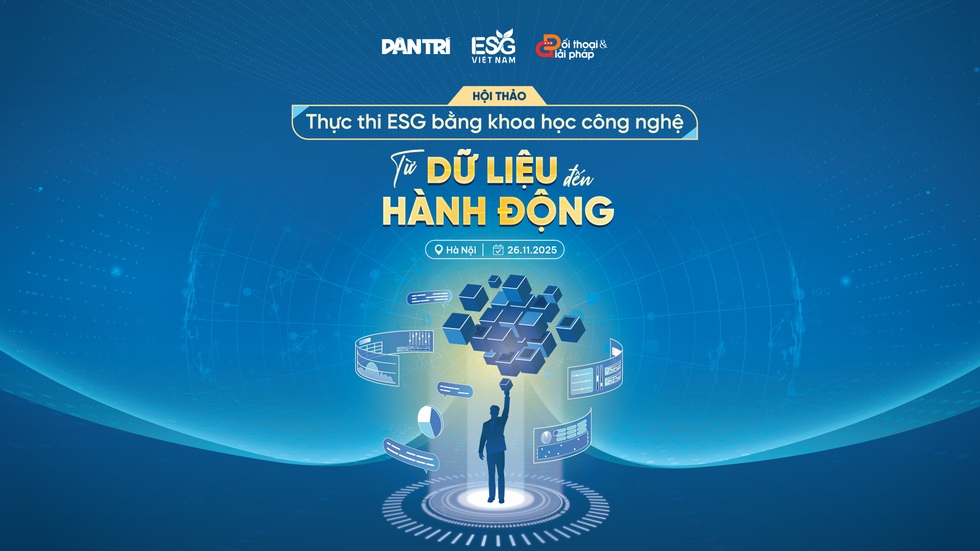According to the “ESG Due Diligence” report by KPMG - one of the four largest auditing and consulting firms in the world , the data room is considered an important initial step in the entire ESG assessment and management process as well as in business appraisal transactions. This initial step includes setting up a centralized data warehouse, with a Q&A feature so that stakeholders can look up and exchange information.
The data warehouse gathers all ESG documents and data, from reports on energy consumption, water, greenhouse gas emissions, occupational safety records, human resource diversity, social welfare, corporate governance policies and processes, to ESG certifications and commitments that businesses are implementing.
How to apply science and technology to implement ESG for different types of businesses, including small and medium enterprises (SMEs), is also part of the content shared at the workshop "Implementing ESG with science and technology - From data to action" organized by Dan Tri newspaper at 1:30 p.m. on November 26, in Hanoi .
This workshop is a satellite activity within the framework of the Vietnam ESG Forum 2025 with the theme "Science and technology and driving force for sustainable development".
Interested readers can register to attend the conference here.
The report emphasizes that the data warehouse not only serves the purpose of business appraisal, but also creates a reliable data platform to evaluate ESG performance in real time, enhancing transparency, information accessibility and investor trust.
This unit recommends that businesses consider data warehouses as core data infrastructure in their ESG strategy, where data is standardized, regularly updated and ready to be shared with stakeholders - from regulators, partners, green credit rating organizations to international investors.
As a result, the data warehouse becomes a tool to help ESG move from “commitment” to “measurable action”, and is also the basis for businesses to apply digital technology, AI and big data analysis in assessing risks and improving ESG performance over time.
ESG data warehouse enhances corporate and banking governance
According to an ESG consultant in Vietnam, a centralized ESG data warehouse acts as a core infrastructure to help businesses digitize, manage and exploit data for sustainable development.
"Specifically, the data warehouse allows the collection of all data related to the environment, society and governance from many different sources: electricity consumption, water, greenhouse gas emissions, supply chain, human resources, labor safety, legal compliance... These data are standardized and updated in real time through IoT systems, ERP or production management software," said the expert.
From there, businesses can apply artificial intelligence (AI) and big data analysis to measure ESG performance, identify risks and make strategic decisions. Management can access the dashboard to track ESG indexes by factory, project or export market.

Image of preparations for the ESG workshop of Dan Tri newspaper (Photo: Hoang Viet).
In addition, he believes that the data warehouse also helps increase transparency in ESG reporting - when businesses can easily share verified data with investors, green credit institutions or international management agencies, thereby improving reputation and access to capital.
In the long term, building an ESG data warehouse is not only a compliance requirement, but also a foundation for businesses to integrate digital transformation and green transformation, creating a sustainable competitive advantage.
In banking, data is fundamental to effective ESG implementation. Collecting and analyzing environmental, social and governance data helps banks accurately assess the risks associated with their credit and investment portfolios. With data, banks can identify high-risk projects or customers, thereby making safe and sustainable credit or investment decisions.
In addition, data is the basis for improving transparency and operational efficiency. Banks use standardized data to fully and accurately report ESG to investors, shareholders and regulators, while improving business processes, reducing costs and shortening due diligence time. When ESG data is integrated into every decision, banks not only reduce risks but also enhance reputation and promote sustainable development in the long term.
How are businesses using data in practice?
As sustainable development becomes a must for modern businesses, the application of international standards and effective data management is becoming increasingly important. Large corporations in Vietnam not only focus on economic growth but also pay attention to environmental impact, social responsibility and transparency in governance.
With standardized, transparent, and real-time data, businesses can assess risks, improve operational efficiency, optimize investment decisions, and develop green products. At the same time, the ability to share reliable data with investors, green credit institutions, and regulators helps strengthen trust, expand access to capital, and create long-term competitive advantages.
In the digital age, data integration becomes a key factor in helping ESG move from commitment to measurable action, shaping the path of sustainable development and responsible growth of businesses.
Mr. Tran Anh Tuan, Deputy Director of the Institute for Applied Research and Business Innovation, said that businesses can use ESG data in three simple steps: measure - record - improve.
According to this person, to start the journey of implementing ESG in a real way, businesses do not need to build a complex measurement system.

The workshop “Implementing ESG with science and technology - From data to action” will be held by Dan Tri newspaper on November 26 (Photo: Dan Tri).
The first step, experts say, is to focus on measuring the numbers that really matter, data that is directly linked to operating costs and export performance, such as electricity, water, scrap rates, occupational safety and environmental compliance. This is information that most businesses already have in their daily production and business processes.
The next step is to systematically record and store data. "With just a simple Excel or Google Sheet file, businesses can track monthly fluctuations: whether electricity consumption increases or decreases, which stages generate a lot of waste, and whether the number of work-related accidents tends to decrease," he said.
Over time, this aggregated and updated data will form an “ESG data room” - a transparent information warehouse that helps businesses easily work with banks, investment funds or export partners.
Finally, the most important step is to turn data into actionable improvements. With concrete figures, businesses can easily see where optimization is needed – whether a machine is consuming too much electricity, a production process is wasting raw materials, or a department needs more training.
From there, businesses can come up with solutions to improve processes, reduce costs, limit risks and better meet ESG and CBAM requirements in export.
"I always tell businesses that ESG is not a burden. ESG is a way to look back at the factory with numbers instead of feelings. And when you see clearly, businesses will know what to do to be better than yesterday," he emphasized.
At Nam Long Group, at the operational level, the company ensures full compliance with environmental and social regulations in Vietnam, expands access to green capital and successfully mobilizes from prestigious international organizations. In parallel with implementing integrated urban projects, the company applies EDGE green building standards to improve energy efficiency, reduce emissions and optimize resources in construction...
In greenhouse gas emissions management, the company records direct emissions from fossil fuels and from 2023 has expanded and standardized the measurement of DO oil consumption, helping CO2 emissions data accurately reflect actual levels. Data security is also focused on, with no valid complaints related to privacy violations or loss of customer data recorded in 2024.
At FPT Corporation, the company aims to strictly comply with legal regulations on privacy and customer data protection.
The company builds a unified data management model across the system, ensuring four factors: security, integrity, availability and quality access. Data collection, processing, storage and use comply with legal principles, for the right purpose, confidential information is not disclosed to the outside unless required by work with appropriate protection measures. Customer data is centrally managed to adjust, secure and improve products and services.
The management system consists of 3 functions: collecting and storing, analyzing valuable data, and processing according to application purposes. At the same time, FPT issues personal security policies and information security management regulations, along with incident handling mechanisms, to ensure the system operates stably, transparently and safely.
Source: https://dantri.com.vn/kinh-doanh/du-lieu-dong-vai-tro-ra-sao-trong-thuc-thi-esg-20251113162026527.htm















































































































Comment (0)